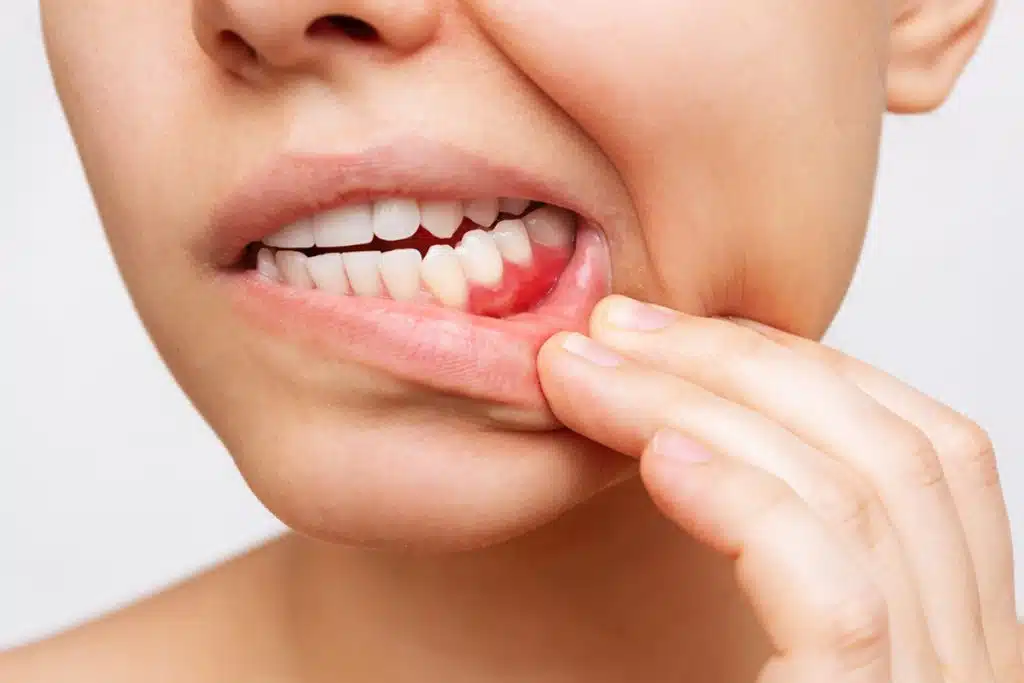Why Do My Gums Bleed?

Are you one of the many people who suffer from bleeding gums? If so, you're not alone. Some studies estimate that around 80% of people living in the United States have some form of gingivitis or bleeding gums. Bleeding gums can have a variety of causes and treatments.
Possible Causes of Bleeding Gums
Bleeding gums are a common health concern and can have a variety of different possible causes. The most common cause is gingivitis, which is an early form of gum disease. Symptoms of gingivitis include red or swollen gums that easily bleed during brushing or flossing. Poor oral hygiene is a leading factor in gingivitis, as it allows bacteria to build up and attack the gums. Genetics can play a role in people who develop gingivitis with some thoughts that around 50% of individuals that have bleeding gums can have a hereditary component. Additionally, hormonal changes often occur throughout pregnancy or during particular stages of aging and can also contribute to gingivitis and result in bleeding gums. To prevent or reduce bleeding gums, it is important to maintain consistent brushing and flossing habits and schedule regular cleanings with your periodontist.
How to Treat Bleeding Gums
Taking care of your gums is important for your overall health as well as your oral hygiene. To treat bleeding gums, cleaning them properly is key. Brushing twice a day with toothpaste and a soft-bristle brush, along with flossing or water flossing daily, can help to reduce inflammation by cleaning out bacteria from the periodontal pockets between the teeth and the gum line. Seeing a periodontist for a deeper cleaning may also be necessary if a standard cleaning does not improve the condition of the gums. A periodontist has special training in diagnosing and treating diseases around the teeth and gums, so they can help determine if there is an underlying issue that needs to be addressed. Treating bleeding gums will require diligence to ensure they heal properly while maintaining good oral hygiene habits can prevent future issues.
When to See a Periodontist for Bleeding Gums
It is important to see a periodontist if you experience continued bleeding of your gums, as this can be an indication of a gum infection or gum recession. If left unchecked, gum recession and infection can lead to bone loss around the teeth, known as periodontal disease. A periodontist will be able to diagnose the issue and offer treatment options which may include antibiotics, deep cleaning, or surgery. Seeing a periodontist for any continued bleeding from the gums is essential to protect your oral health and prevent future discomfort.
Foods to Eat and Avoid with Bleeding Gums
When suffering from bleeding gums, it is important to alleviate the symptoms by eating alkaline diets and avoiding highly processed sugars and acids. Eating alkalizing foods like green vegetables can help balance the acidity in the mouth as well as soothe and heal any inflamed areas. It is also important to drink plenty of water throughout the day to stay hydrated and rinse away bacteria that can cause additional gum irritation and swelling. Avoiding high sugar foods is also essential; sugary snacks like candy or fructose can actually weaken your gums over time, leading to further discomfort and dental problems. Furthermore, processed foods are generally unhealthy for several reasons; they often contain trans-fats which may cause inflammation, they tend to be high in sodium which encourages water retention, and they often lack necessary vitamins and minerals needed for proper gum health. Therefore, opting for nutritious alkaline foods with plenty of fluids is a great step towards improving bleeding gums.
What Vitamins are Best for Gum Health?
Vitamin C has long been known to be the most beneficial vitamin when it comes to gum health, protecting gums from irritation and inflammation. Vitamin B3 can also help keep gums in good condition by helping regenerate weakened tissue. Vitamin B6 is also important for healthy oral health, as it helps prevent bacterial growth around the gums and tooth enamel. Vitamin B9 plays an important role in reducing gum disease while Vitamin B12 helps maintain strong bone mass which is essential for good gum health. Vitamin E not only keeps gums well moisturized but can also aid in the regeneration of damaged tissues. Lastly, Calcium helps keep teeth strong and can help protect against plaque buildup on gums that causes disease. All of these vitamins together create a powerful mixture for keeping your gums healthy and your smile bright!
Prevention of Gum Disease
Taking care of your teeth is essential for maintaining that healthy, beautiful smile, and preventing gum disease. Prevention starts with using two steps: proper brushing and rinsing. It is also important to floss daily and visit the dentist for regular cleanings. Additionally, people should take into consideration what they eat since poor nutrition can lead to gum disease. A diet lacking in vitamins, minerals and probiotics can contribute to unhealthy bacteria buildup which in turn may cause gum problems such as leaky gut syndrome. Treating this condition requires altering one's diet to include foods/supplements that support good bacteria while limiting those that promote unhealthy bacteria. By following these instructions, you will be taking great strides towards having a healthier mouth!
In Summary:
Bleeding gums can be a sign of underlying issues and should not be ignored. By understanding the various causes, our patients now have some possible solutions to address bleeding gums. A combination of treatments like professional dental cleaning and home remedies is usually necessary to fight off the infection and stop the bleeding. Eating healthy foods, avoiding sugary snacks and drinks, and keeping up with good oral hygiene are all important for prevention. If left untreated gum problems can lead to other serious health issues, so it’s important to take action when you observe any signs of bleeding gums. Consulting with a periodontist who is knowledgeable about gum diseases might be the best way for patients to find their individualized solution for solving the issue at hand. For more information, please contact our office for a consultation.
